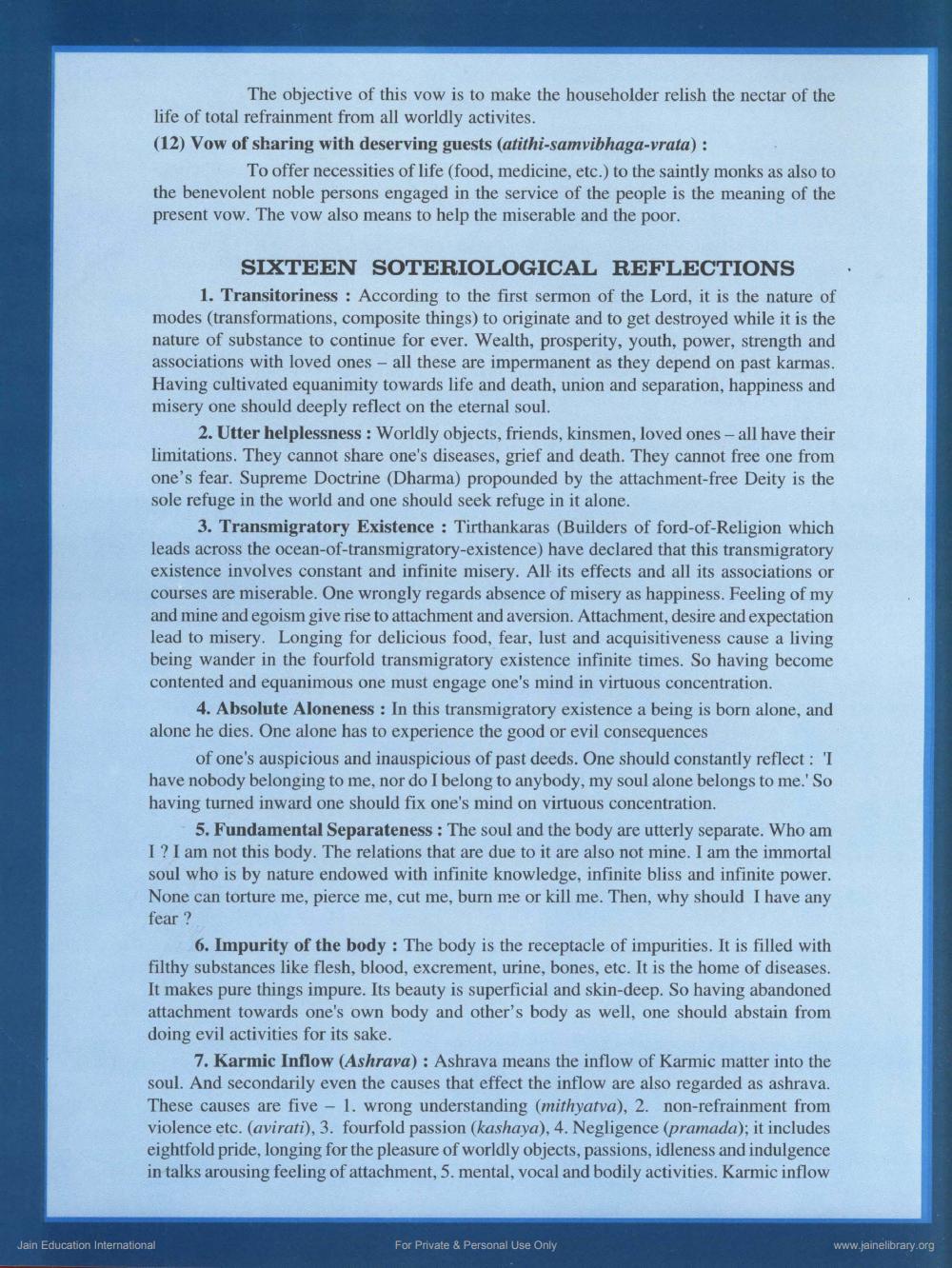________________
The objective of this vow is to make the householder relish the nectar of the life of total refrainment from all worldly activites. (12) Vow of sharing with deserving guests (atithi-samvibhaga-vrata):
To offer necessities of life (food, medicine, etc.) to the saintly monks as also to the benevolent noble persons engaged in the service of the people is the meaning of the present vow. The vow also means to help the miserable and the poor.
SIXTEEN SOTERIOLOGICAL REFLECTIONS 1. Transitoriness : According to the first sermon of the Lord, it is the nature of modes (transformations, composite things) to originate and to get destroyed while it is the nature of substance to continue for ever. Wealth, prosperity, youth, power, strength and associations with loved ones - all these are impermanent as they depend on past karmas. Having cultivated equanimity towards life and death, union and separation, happiness and misery one should deeply reflect on the eternal soul.
2. Utter helplessness : Worldly objects, friends, kinsmen, loved ones - all have their limitations. They cannot share one's diseases, grief and death. They cannot free one from one's fear. Supreme Doctrine (Dharma) propounded by the attachment-free Deity is the sole refuge in the world and one should seek refuge in it alone.
3. Transmigratory Existence : Tirthankaras (Builders of ford-of-Religion which leads across the ocean-of-transmigratory-existence) have declared that this transmigratory existence involves constant and infinite misery. All its effects and all its associations or courses are miserable. One wrongly regards absence of misery as happiness. Feeling of my and mine and egoism give rise to attachment and aversion. Attachment, desire and expectation lead to misery. Longing for delicious food, fear, lust and acquisitiveness cause a living being wander in the fourfold transmigratory existence infinite times. So having become contented and equanimous one must engage one's mind in virtuous concentration.
4. Absolute Aloneness : In this transmigratory existence a being is born alone, and alone he dies. One alone has to experience the good or evil consequences
of one's auspicious and inauspicious of past deeds. One should constantly reflect : 'I have nobody belonging to me, nor do I belong to anybody, my soul alone belongs to me.' So having turned inward one should fix one's mind on virtuous concentration.
5. Fundamental Separateness : The soul and the body are utterly separate. Who am I ? I am not this body. The relations that are due to it are also not mine. I am the immortal soul who is by nature endowed with infinite knowledge, infinite bliss and infinite power. None can torture me, pierce me, cut me, burn me or kill me. Then, why should I have any fear?
6. Impurity of the body : The body is the receptacle of impurities. It is filled with filthy substances like flesh, blood, excrement, urine, bones, etc. It is the home of diseases. It makes pure things impure. Its beauty is superficial and skin-deep. So having abandoned attachment towards one's own body and other's body as well, one should abstain from doing evil activities for its sake.
7. Karmic Inflow (Ashrava): Ashrava means the inflow of Karmic matter into the soul. And secondarily even the causes that effect the inflow are also regarded as ashrava. These causes are five - 1. wrong understanding (mithyatva), 2. non-refrainment from violence etc. (avirati), 3. fourfold passion (kashaya), 4. Negligence (pramada); it includes eightfold pride, longing for the pleasure of worldly objects, passions, idleness and indulgence in talks arousing feeling of attachment, 5. mental, vocal and bodily activities. Karmic inflow
Jain Education International
For Private & Personal Use Only
www.jainelibrary.org




